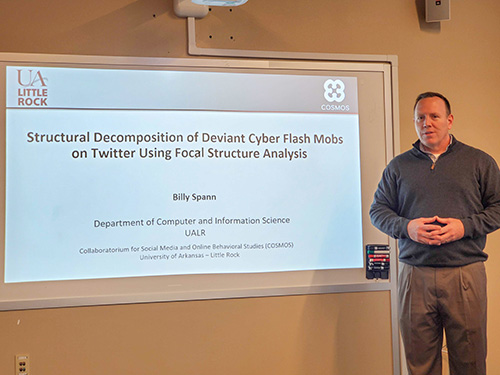
Billy Spann successfully defended his master’s thesis “Structural Decomposition of Deviant Cyber Flash Mobs on Twitter Using Focal Structure Analysis” Friday, November 22, 2019. In attendance were committee members Dr. Nitin Agarwal (chair), Dr. Elizabeth Pierce, and Dr. Dan Berleant as well as members of COSMOS.
Since he joined COSMOS in the summer of 2018, Billy has developed an interest in studying collection action groups. He familiarized himself with the deviant cyber flash mobs (DCFM) model developed by Dr. Samer Al-khateeb and Dr. Agarwal and used it as a stepping stone for his work. The goal of his research was to use DCFM structural network models to assess the impact of collective action measurements within the community detection methods of Focal Structure Analysis (FSA).
Billy used a Twitter dataset for his research. It consisted of 9,992 tweets, 2,085 mentions and 77 retweets published by 1,771 users. Using the previously mentioned DCFM model he was able to calculate control, interest, and power to estimate the power of user in the network. After identifying influential users, Billy then aimed to identify influential groups. To do so, he created the communication network using the retweets and mentions that connect users and then ran his model to determine the focal structures within the network. These FSAs are ranked based on the sum of power for all users within that focal structure. He identified several factors: (1) utility – the benefits an individual gains from the DCFM success or fail, (2) interest – how much interest the user has based on the benefits gained, (3) power – how powerful that user is in the group and (4) control – how much control the user has on the outcome of the DCFM. These factors are then used to create a computational model to predict a DCFM’s success or failure.
Billy’s research is featured in an upcoming publication titled “Using Computational Social Science Techniques to Identify Coordinated Cyber Threats to Smart City Networks.” which will be presented at the 1st Joint International Conference on Design and Construction of Smart City Components (JICSmartCities) in Egypt next month.
